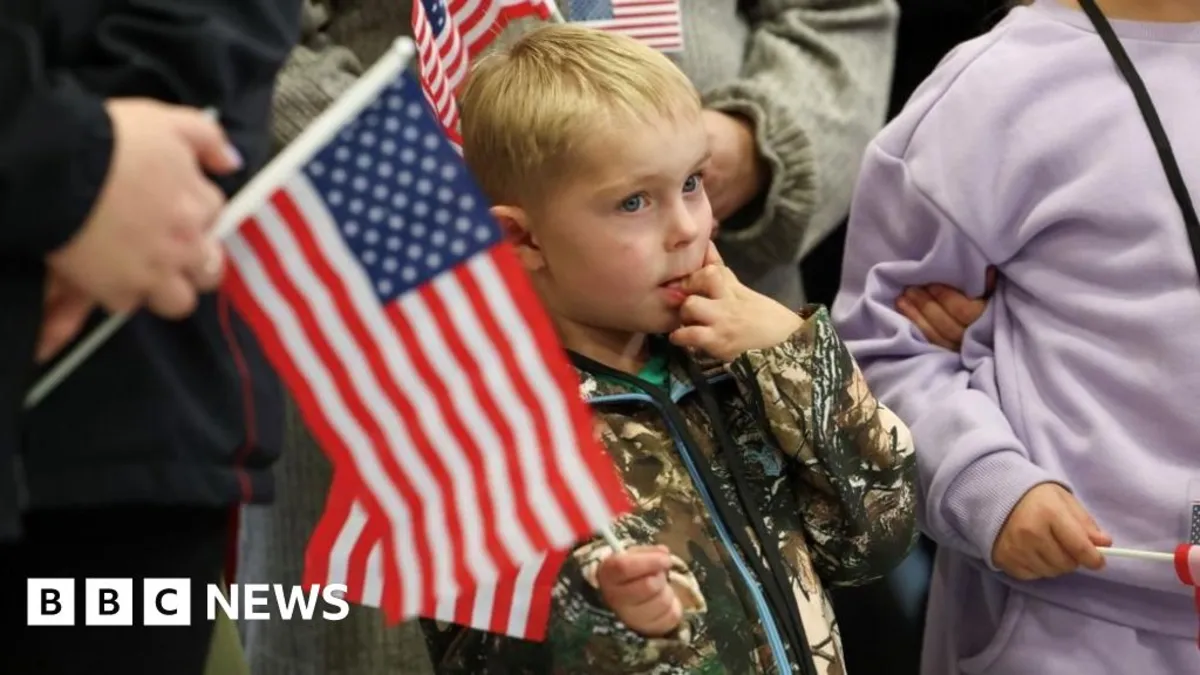
Recently, US President Donald Trump has made headlines by granting members of South Africa's Afrikaner community refugee status, asserting that a genocide is occurring in the country. Following this declaration, nearly 60 Afrikaners have arrived in the United States after being granted asylum. The South African government permitted the US embassy to process their applications within the country and facilitated their boarding of a chartered flight from Johannesburg's main international airport, an atypical scenario for refugees escaping persecution.
The term "Afrikaners" refers to a cultural group in South Africa, primarily descended from Western European settlers who arrived at the southern tip of Africa in the mid-17th century. According to South African History Online, Afrikaners consist primarily of Dutch (34.8%), German (33.7%), and French (13.2%) ancestry, creating a distinct cultural identity deeply intertwined with the African landscape. The Afrikaans language, closely related to Dutch, is a significant aspect of their heritage. Historically, Afrikaners, also known as Boers (meaning farmers), played a crucial role in agriculture within South Africa.
In 1948, an Afrikaner-led government instituted apartheid, a system of institutionalized racial segregation that enforced strict laws prohibiting interracial marriage, reserved skilled jobs for white individuals, and confined Black South Africans to designated areas known as townships. The infamous Afrikaner leader Hendrik Verwoerd famously stated that Black individuals should not be exposed to education, reinforcing the oppressive societal structure. The dominance of Afrikaners in South Africa diminished significantly after the end of apartheid in 1994 when Nelson Mandela and the African National Congress (ANC) came to power, enabling Black citizens to vote for the first time.
Despite Trump's assertions, no major political party in South Africa, including those representing Afrikaners and the broader white community, has officially claimed that a genocide is taking place. Such allegations have gained traction among right-wing groups over the years. The claims often stem from reports of violence against white farmers or misleading information circulating online. A South African judge dismissed the idea of genocide as unfounded during a ruling related to a case involving a donation to a white supremacist group earlier this year.
While South Africa does not provide crime statistics categorized by race, the latest data indicate that 6,953 murders occurred in the country between October and December 2024, with only 12 of those involving farm attacks. Among those attacked, one was a farmer, while the others included farm dwellers and employees, who were likely Black. This statistic raises questions about the accuracy and context of claims regarding violence against white farmers.
In defending his decision to grant refugee status to Afrikaners, Trump reiterated his belief that a genocide is occurring in South Africa, claiming that white farmers are being brutally murdered and their lands seized. He expressed uncertainty about attending the upcoming G20 summit in South Africa amid such tensions, stating, "I don't know how we can go unless that situation's taken care of."
South Africa's President Cyril Ramaphosa has firmly rejected the notion that individuals of a specific race are facing persecution, suggesting that those leaving the country do so because they resist the ongoing changes within its constitutional framework. Ramaphosa emphasized that the government is not expropriating land from farmers but instead working to address historical injustices faced by Black South Africans during the apartheid era. The Democratic Alliance (DA), a major opposition party, has expressed opposition to land reform legislation, arguing that it threatens property rights.
Entrepreneur Elon Musk, who was born in South Africa, has also weighed in on the issue, criticizing the country's ownership laws and claiming that his satellite internet service provider, Starlink, was barred from operating in South Africa due to his race. To operate legally, Starlink must comply with regulations requiring 30% ownership by historically disadvantaged groups, which primarily include the Black population, previously marginalized under apartheid. The Independent Communications Authority of South Africa (ICASA) stated that Starlink has yet to submit a licensing application.
Musk further accused the Economic Freedom Fighters (EFF), a political party in South Africa, of promoting a genocidal ideology through a controversial song sung at its rallies. The lyrics of "Shoot the Boer," a song popularized during the anti-apartheid movement, have been criticized by Afrikaner advocacy groups, who argue that it incites violence. However, South Africa's Supreme Court ruled that the song is protected as a form of political expression.
Despite Trump's offer, it appears that most Afrikaners are not inclined to relocate to the United States. A business group reported in March that approximately 70,000 Afrikaners showed interest in moving to the US, which is a small fraction of the estimated 2.5 million Afrikaners in South Africa. The US embassy recently clarified that its resettlement criteria apply to individuals from any racial minority who can demonstrate a history or fear of persecution, not solely Afrikaners.
According to the 2022 census, South Africa's population comprises various ethnic groups, with Coloured individuals (people of mixed race) representing 8%, followed by white individuals, including Afrikaners, at 7%, and Asians at 3%. In light of Trump's offer, the Afrikaner lobby group Solidarity published an article titled "Ten Historical Reasons to Stay in South Africa," emphasizing their commitment to the nation. Leaders from the right-wing Freedom Front Plus party echoed this sentiment, asserting their dedication to building a future in South Africa.
For more in-depth coverage and updates on this evolving story, visit BBCAfrica.com and follow our social media channels for the latest news from the African continent.